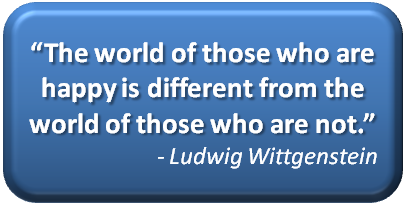Why Be Happy?

As it turns out, there are many reasons for us to be happier – and yes, it is all well worth it ... because as the quote to the left states, “the world of happy people is different from the world of unhappy people.”
Why?
Well, because research has shown that happy people:
- Live longer
- Are healthier and have less diseases and illness
- Have better, longer-lasting relationships (even less incidence of divorce)
- Have higher incomes and are wealthier
- Raise happier, more balanced, successful children
- Deal with stress better

So, these are a few “fairly”
good reasons to be happy. I actually
think these are excellent reasons, but I’m being conservative here.
Beyond this, though, if we explore some of the reasons why the above statistics are true, it gets even more interesting and compelling.
Just take stress as an example. Stress is a fact of life for just about everyone these days, and our ability to handle stress has a significant influence on our health and well-being. For example, psychologists have developed a “stress list” – which is essentially a list of the most common life events we experience as human beings. The list includes things like death of a spouse, marriage, divorce, change in work responsibilities, taking out a loan, minor violations of the law, and even vacations.
Click here to see the entire list.
Then, each event has a “score” associated with it which relates to the amount “impact” that event has on us (death of a spouse, for example, has a score of 100). When the events in our lives at any particular time are added up, the total “stress score” determines what percentage chance we have of developing a “stress-related illness” - ranging from minimal to about 80%!! And these “stress-related illnesses” are significant. They are things like:
|
|
And check out these scary statistics:
- 25 million people in the US and 150 million people globally are “depressed”
- Depression is the leading cause of disability for people 15-44 years old (cost to the US estimated at $35 billion annually)
- 1 in 5 people in the US are on anti-depressant or anti-anxiety drugs (that’s 60 million people) … costing over $20 billion annually (and $75 billion globally)
- Preschool children (kids under 5 years old) have been leading the growth in antidepressant drug use
Yes, stress, depression, anxiety, and these related diseases associated (at least partly) with “unhappiness” are costing our society billions and billions of dollars annually. Even worse, we as human beings (including young children under 5 years of age) are being subjected to chronic drugs which always have some negative side effects.
So, it appears very clear that there are many reasons to be happy, and clear evidence that “unhappiness” must be reduced.
That’s what this website – and the whole BeHappy! system – is all about.
So, use the tools found here to reduce unhappiness and create authentic, lifelong happiness. If you do nothing else, get the FREE Happiness Formula Video Course by filling in the information in the boxes to the right. With this 5-part course, you will learn a simple formula for creating your happiest possible life.
BeHappy! my friends
 Live Longer, Live Healthier, and Be Happier with this new Ebook. Get it now for just $1.99 Learn why the weight loss, disease prevention, and nutritional information we have regarded as "facts" for decades may not be true - and how you can improve your health and your lifespan dramatically with some simple changes. |
PLEASE CONSIDER...
If the information on this site helps you and you'd like to make a donation to BeHappy101.com (to help make others happy), please click on the button below to make a contribution. The amount you donate is entirely up to you. A portion will used to contribute to the happiness of others and is greatly appreciated. [WHY DONATE?] |


 I'm Jimmy, the founder and creator of this site and the whole BeHappy! system. My life's purpose is to be a positive, creative force for health and happiness and through this website, my books, coaching, and happiness-building programs, I intend to help as many people as possible live their happiest possible lives.
I'm Jimmy, the founder and creator of this site and the whole BeHappy! system. My life's purpose is to be a positive, creative force for health and happiness and through this website, my books, coaching, and happiness-building programs, I intend to help as many people as possible live their happiest possible lives.